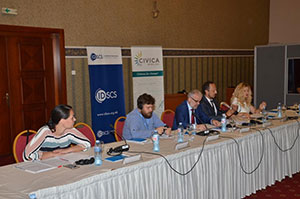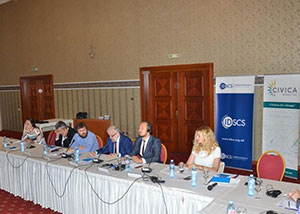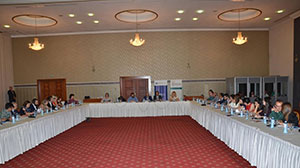 Wednesday, June 28th 2017
Wednesday, June 28th 2017
ADDRESS BY PRESIDENT XHAFERI AT THE CONFERENCE DEDICATED TO STRENGTHENING AND THE ROLE OF THE PARLIAMENT OF THE REPUBLIC OF MACEDONIA
Ladies and gentleman,
Distinguished present,
It represents a special honour and pleasure for me to open the today's Conference dedicated to the strengthening and the role of the Parliament of the Republic of Macedonia. The Parliament is one of the key institutions for the return of the Republic of Macedonia to the democratic flows and Euro-Atlantic integrations, and that is why I am convinced that the topics proposed for the today's discussions will result with a constructive debate. Debate which will produce I believe quality conclusions and orientations which will latter be implementable and will contribute in rising of the political culture in the parliamentary discourse. Baring in mind the fact that the power is by default at the executive power, the modern parliamentary democracy has incorporated the principle of supervision by the legislative power over the executive. The strengthening of this function of the legislative power through appropriate mechanisms and European practices, will contribute to rising of the level of accountability of the executive power.
Distinguished,
If we look from the normative point of view, there are no major obstacles for exercising the supervisory function of the Assembly over the executive power. Still, the practise lags behind the normative regulation. In that context, it requires political will for making a practice for genuine control over the executive. I am convinced that this parliamentary majority possesses the required critical will to move things in a positive direction when it comes to realisation of the supervisory function of the Parliament of the Republic of Macedonia.
 When we speak about the functioning of the parliamentary democracy, naturally our first association is the Assembly and it's role, and if you want, the perception and the trust that the public has towards the parliament itself. And, that perception depends before all, of the transparent work of the Assembly as a legislative power, furthermore, of every deputy, even of the Parliamentary Service. I think that, in this sphere, as a Parliament and as deputies, there are a lot of challenges waiting ahead. In doing so, I must underline that when speaking of transparency, we are not starting from scratch but, we have achieved a certain level which is acknowledged by our international friends also. To remind you, we are the first in the region to introduce the so called E-parliament, further more, our website which according to the research represents an important tool through which information and transparency for the work of the Assembly, of the working bodies and committees is provided, and of course of the deputies. Through our official website, one can find all the materials submitted for a parliamentary procedure, after that, following of the legislative process from the so called first reading to the adoption of a law. Also, through live streaming one can follow live the plenary session, while the archive contains video recordings from all the plenary sessions of the Assembly since the independence, to present. On our website we also publish the edition "My deputy", which publishes every six month and where a lot of statistical data about the work of each deputy can be found. Furthermore, one can find also the annual reports where all the activities of the Assembly are comprised. The Parliamentary channel also is in the function of informing the opinion and ensuring transparency in the work of the Assembly. Since we are speaking about the beginning of a period of a new mandate precisely about the Parliamentary channel, soon I would like to initiate before the Council of the Parliamentary channel a debate about how to enrich the content of the Parliamentary channel, which now only has live broadcast of the plenary sessions, as well as the sessions of the Committee of Finance and Budget, when it debates about the adoption of the State Budget. The Parliamentary channel does also rebroadcasting of the committees and other working bodies. It seems that after all, we'll have to think also about more clearly normative regulation of the Parliamentary channel.
When we speak about the functioning of the parliamentary democracy, naturally our first association is the Assembly and it's role, and if you want, the perception and the trust that the public has towards the parliament itself. And, that perception depends before all, of the transparent work of the Assembly as a legislative power, furthermore, of every deputy, even of the Parliamentary Service. I think that, in this sphere, as a Parliament and as deputies, there are a lot of challenges waiting ahead. In doing so, I must underline that when speaking of transparency, we are not starting from scratch but, we have achieved a certain level which is acknowledged by our international friends also. To remind you, we are the first in the region to introduce the so called E-parliament, further more, our website which according to the research represents an important tool through which information and transparency for the work of the Assembly, of the working bodies and committees is provided, and of course of the deputies. Through our official website, one can find all the materials submitted for a parliamentary procedure, after that, following of the legislative process from the so called first reading to the adoption of a law. Also, through live streaming one can follow live the plenary session, while the archive contains video recordings from all the plenary sessions of the Assembly since the independence, to present. On our website we also publish the edition "My deputy", which publishes every six month and where a lot of statistical data about the work of each deputy can be found. Furthermore, one can find also the annual reports where all the activities of the Assembly are comprised. The Parliamentary channel also is in the function of informing the opinion and ensuring transparency in the work of the Assembly. Since we are speaking about the beginning of a period of a new mandate precisely about the Parliamentary channel, soon I would like to initiate before the Council of the Parliamentary channel a debate about how to enrich the content of the Parliamentary channel, which now only has live broadcast of the plenary sessions, as well as the sessions of the Committee of Finance and Budget, when it debates about the adoption of the State Budget. The Parliamentary channel does also rebroadcasting of the committees and other working bodies. It seems that after all, we'll have to think also about more clearly normative regulation of the Parliamentary channel.
Distinguished, The cooperation and communication with the civil society sector, with the professional public and the citizens also represents an important segment when talking about the functioning, the transparency and the openness of the legislature. As first among the equals in the Parliament of the Republic of Macedonia, in several occasions I clearly express the openness of the Assembly towards the non-governmental sector in the direction of cooperation for the improvement and strengthening of the capacities of the legislative power in the Republic of Macedonia.
 Of course, this is not where the duty ends when talking about the role but also the responsibility of the Parliament, in achieving the principles of the parliamentary democracy, which is a dynamic category and which should continuously be upgraded. Within that framework, as a President of the Assembly, starting from my constitutional and procedural competencies, once more, I want to underline that I will be always opened and ready to talk about any criticism, proposal or initiative deriving from the non-governmental sector, the professional public, deputy or parliamentary group, even from the Parliamentary service. I think that in the next period we'll have a successful and fruitful cooperation with all the stakeholders. From us, who are in the Parliament, but also the other social and state entities depends how we'll turn this initiatives into positive practices. There will be a responsible and painstaking task ahead.
Of course, this is not where the duty ends when talking about the role but also the responsibility of the Parliament, in achieving the principles of the parliamentary democracy, which is a dynamic category and which should continuously be upgraded. Within that framework, as a President of the Assembly, starting from my constitutional and procedural competencies, once more, I want to underline that I will be always opened and ready to talk about any criticism, proposal or initiative deriving from the non-governmental sector, the professional public, deputy or parliamentary group, even from the Parliamentary service. I think that in the next period we'll have a successful and fruitful cooperation with all the stakeholders. From us, who are in the Parliament, but also the other social and state entities depends how we'll turn this initiatives into positive practices. There will be a responsible and painstaking task ahead.
It is not rare for authority and power to corrupt man. Therefore, we should ensure real mechanisms where we will have rule of law and highly developed political culture and sense of responsibility, to prevent the misuse of that power. I think that all of us together, if we truly love this country of ours, if we are responsible for the present but also for the future of the generations to come, we should really in all our capacity work in realisation of this principles and standards. And, once more in the end, I will repeat that above all, the responsibility is on us, who received the mandate from the citizens, to lead the country but the responsibility also lies on other social entities and also each individual in the capacity of a citizen of this society.
Thank you for the attention.